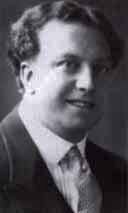Walter Widdop facts for kids
Walter Widdop (born April 19, 1892 – died September 6, 1949) was a famous British opera singer. He was a tenor, which means he had a high male singing voice. Walter Widdop was especially known for singing in operas by Richard Wagner, a famous German composer. He also sang music by other great composers like Giuseppe Verdi, George Frideric Handel, and Johann Sebastian Bach.
Contents
Walter Widdop's Singing Journey
Early Life and First Steps
Walter Widdop was born in a place called Norland, near Halifax, in Yorkshire, England. When he was a teenager, he worked in a factory that made wool. But he also loved to sing! He sang in his church choir and won many singing contests in his home county. People often said his voice was a "God-given" talent. A local teacher, Arthur Hinchcliffe, helped him make his voice even better. Walter also served in the British Army during World War One and got married in 1917.
Becoming an Opera Star
In 1923, Walter Widdop started performing on the radio for the BBC, which was a big deal back then. In the same year, he sang in his first professional opera. This was in Leeds, where he played the character Radames in Giuseppe Verdi's opera Aida.
The next year, he made his first appearance in London. He sang the main role in Richard Wagner's opera Siegfried at the Royal Opera House, a very famous theater. Walter Widdop became very well known for singing Wagner's music. He even made recordings, like his role as Siegmund in an early album of music from Die Walküre. He sang Siegmund at Covent Garden in 1932 and Tristan in 1933, 1937, and 1938. He performed with other amazing singers, including Florence Austral and Eva Turner. Many of his old recordings are still available today on CDs.
Different Roles and Travels
Walter Widdop was always in demand for his powerful voice. He could sing very challenging "Heldentenor" roles, which are heroic parts in operas that need a strong, clear voice. He also sang in many Italian operas. But he didn't just sing the big, heavy roles. In 1928, he sang in Christoph Willibald Gluck's Armide and George Frideric Handel's Rodelinda. He also traveled to Australia to perform. In 1936, he sang the main role in the first British performance of Igor Stravinsky's opera Oedipus rex.
Oratorios and Choral Music
Besides opera, Walter Widdop also sang in oratorios and other choral music. An oratorio is like an opera but usually without costumes or acting. It's often based on religious stories. In 1928, he sang in Handel's Solomon and in the Requiem by Verdi. In 1929, he helped make the first full recording of Bach's Mass in B Minor. He also sang in Edward Elgar's The Kingdom in 1932.
He recorded many famous songs from oratorios, like "Sound an Alarm" from Judas Maccabaeus and "Waft her, angels" from Jephtha. Music experts, like J.B. Steane, have praised his strong voice and excellent singing technique. They say his recordings show he was one of the best heroic tenors of his time.
Later Years and Legacy
In 1938, Walter Widdop was one of four tenors chosen to sing in a special piece of music called Serenade to Music by Ralph Vaughan Williams. This music was written to celebrate a famous conductor, Sir Henry Wood. Walter Widdop sang the line "Still quiring to the young-eyed cherubins."
He also toured and sang in Spain, the Netherlands, and Germany. During World War Two, he traveled to South Africa, Canada, and the Middle East to entertain soldiers. After the war, he continued his singing career. In 1949, he sang the main role in Wagner's Parsifal in London.
Walter Widdop sang less in his final years. His last performance was at The Proms in London on September 5, 1949, where he sang "Lohengrin's Farewell." The very next day, he sadly passed away in Hampstead.
 | Delilah Pierce |
 | Gordon Parks |
 | Augusta Savage |
 | Charles Ethan Porter |


